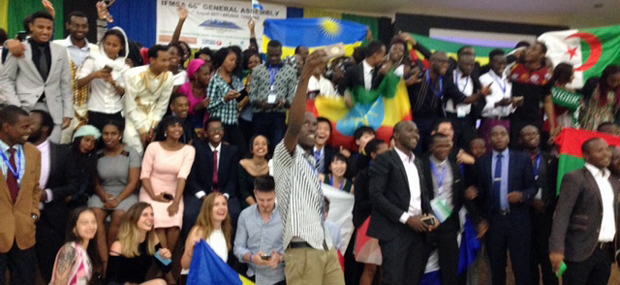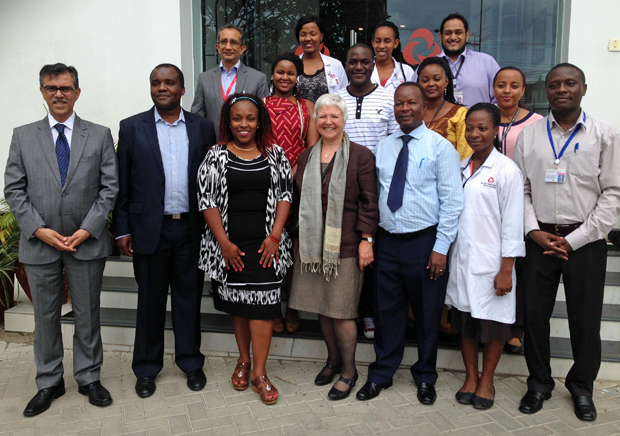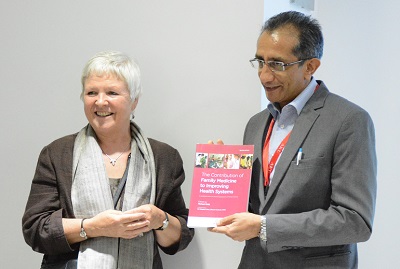From the President: September 2017
 Photo: Medical students celebrating the opening ceremony of the 2017 IFMSA meeting in Arusha, Tanzania
Photo: Medical students celebrating the opening ceremony of the 2017 IFMSA meeting in Arusha, Tanzania
Español français
Networks, opportunities and prioritisation – does enthusiasm need to be balanced with realism?
I have had a busy month, and by the time you read this I will have done at least two, if not three, further overseas trips. The travel for the President in a two year term gets pressed into the year that falls between the two global conferences, so I have nine overseas trips between August and November 2017!
It is a pleasure and privilege to meet so many colleagues worldwide, but this is causing me to think about what the President adds when we visit. The example I will discuss here is my recent trip to Tanzania, where I was originally invited as a keynote speaker for the global conference of the International Federation of Medical Student Associations (
IFMSA). Founded in 1951, it has a particularly admirable agenda about social accountability and the need to train doctors for the population’s needs. The IFMSA and WONCA have a formal collaboration, with a newly updated Memorandum of Understanding, and I was honoured to be one of only four external speakers at their conference in Arusha, Tanzania. More than 900 enthusiastic students from over 100 countries – and you can imagine it was quite a party, and I was delighted by the number who took time to come and discuss family medicine with me.
I was last in Tanzania, in 1976, when I myself was a third year medical student, and I could fully appreciate their passion and interest in reaching out to others across regional and cultural divides. Congratulations to all who had a part in this, including the local Tanzanian student hosts, and look forward to working together to impact on medical education at university level.
Then to Dar es Salaam, following in the footsteps of our WONCA Africa region president, Dr Henry Lawson, who enabled me to find local links and meet with the pioneers of family medicine. Tanzania is a large country, with high levels of poverty, weak infrastructure, and a combination of challenges. The Tanzanian Association of Family Medicine has six founder members, of whom three are recent residents, and only one university (Aga Khan) running a residency scheme. I was honoured to be part of a daylong workshop attended by representatives of the Ministry, the Associate Dean and CEO for Health Sciences at Aga Khan University, and other providers who play a large role in urban healthcare. I also visited three clinics and helped with their OSCE assessment for the year two residents.
 Photo: The President with residents, staff, AFRIWON leader Joy Mugambi (next to
Amanda) and ministry representatives at the Aga Khan University in Dar
es Salaam
Photo: The President with residents, staff, AFRIWON leader Joy Mugambi (next to
Amanda) and ministry representatives at the Aga Khan University in Dar
es Salaam
The networking at both events was valuable, and since I returned I have read more, linked into the WHO Country office, and sent resources and ideas about curriculum, regional support, and further professional links within the country. The purpose of the title above is to think about what is involved in such a visit - and what happens afterwards. Each visit involves lengthy preparation – strategic decisions about which invites to accept; practical choices about travel and accommodation; sometimes the joys of visas and travel vaccines; background reading, including preparing keynotes; then being there, engaging, delivering; and afterwards trying to maximise the followup by putting people in touch with each other - especially professional leaders and WHO / Ministry contacts.
How would you evaluate such a trip? How do we prioritise who goes where for WONCA? In the end I rely on regional colleagues to advise on where to go and who to meet.
At a national level I prioritise members early in their development, and am told that visits like these are immensely encouraging and thought provoking for those who are trying to carry a torch for family medicine. We had important learning conversations, both among the students and the Dar es Salaam Family Medicine leaders – who are also supported by work with colleagues in Kenya, including Joy Mugambi from the WONCA Africa region executive.

Photo : The President presents a copy of the WONCA Guidebook to Dr Riaz Ratansi,
Head of the Department of Family Medicine at the Aga Khan University,
Tanzania
In the end, the same approach which is successful and much appreciated by patients - a focused conversation with an expert who is both analytic and empathic, and is interested in what will help you as a person – can motivate and encourage us all to keep on trying, against some odds, to deliver on a vision and work for good.
Kila la kheri (All the best), Tanzania! We can continue the regional conversation in Pretoria in late August. And I hope to see many medical students worldwide who now think about family medicine as their future.
Amanda Howe
WONCA President